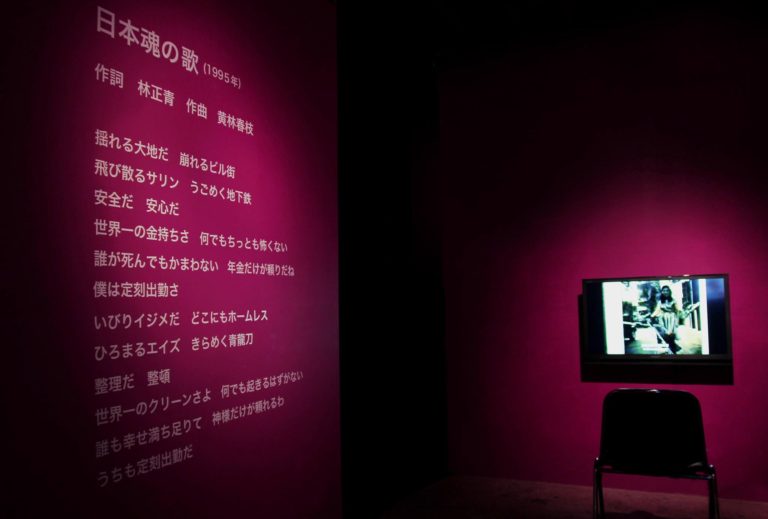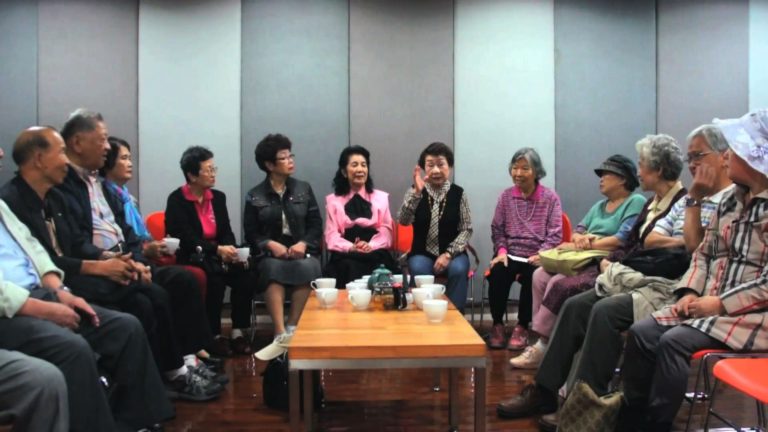「appearing」と題された本プロジェクトは、坂野充学が台湾に残る日本語教育や文化的な背景と、それらを享受してきた高齢世代たちの現在の活動に興味をもち、彼自身が、台湾で唯一の日本語ケア施設「玉蘭荘」を訪問するところからはじまります。今回の展示では、玉蘭荘でのプログラムや日本教育をうけた台湾の人々による対話の記録映像、また玉蘭荘で偶然に出会ったアマチュアシンガーソングライターである黄林春枝(82歳)が、自身で制作したミュージックビデオ集から構成されています。年少期の約7年間を日本で過ごした黄林春枝が夫・林正青と共同制作した、楽曲およびミュージックビデオは、今回が一般に発表されるはじめての機会となります。
今回改めて撮影された「日本魂の歌」では、作詞を担当した林が武士道として親しんだ日本魂と、戦後半世紀経った日本で彼が感じた日本魂が、ユーモアと皮肉を織り交ぜて表現されます。その歌詞と柔らかなメロディーからは彼らの日本への愛情が伺えますが、一方で地震、人為災害、いじめ、年金などの風刺のきいたフレーズは、制作から20年経った現在でも、私たちに緊迫感を与えます。
これらの映像は、台湾の戦前・戦後を体験した生き字引たちのすがたを描き出すと同時に、風化されゆく歴史や記憶を可視化する試みです。
Mitsunori Sakano’s visual project “appearing” is about the remaining Japaneseeducation and Culture in Taiwan. And the level of interest in it and usage of it by thesenior generation, it starts from visiting ‘Gyokuranso’. ‘Gyokuranso’ is a place where before the Taiwanese have received Japanese Educationand Taiwanese or Japanese use Japanese to express their thoughts living in Taiwan.With 25 years of continuous education services, this is a unique place in Taiwan.This project focuses on about the 80 years old amateur singer-songwriter Harue Kourin,Mitsunori met at Gyokuranso by chance. A document of Program at Gyokuransho,discussion among Taiwanese who have received Japanese Education and selected music videos by Harue Kourin herself will also be exhibited. Harue Kourin went to grammar and middle school in Japan for about 7 years, due to herfather’s work. 2 years after the war was over, she returned to Taiwan. With the dream of becoming a singer as a basis, she started out as an amateur songwriter.Furthermore she was influenced by her husband, Seisei Hayashi who also received Japanese education. She started to teach herself the piano and write songs in Japanese, but at the sametime in Chinese and Taiwanese.The video work for her song “song of Japanese spirit” has been filmed for this exhibition.The song is based on the experiences her husband Hayashi had on a 3 year business stay in Japan. It talks in a humoristic and sarcastic way about how the warrior spirit (bushido) of Japan he had believed in and the spirit he experienced 50 years after the war are interweaved. Her husband’s love of Japan can be heard, just as stories of Earthquakes, human suffering, blying and pensions all in the sprit of satire. Even though it has been 20 years since thissong has been written, the soft melody as a contrast to those lyrics still creates an interesting tension. To sum it up, it draws a picture of the loving memories of one woman about her preand post-war experiences
Supported by Gyokuran-so/ Taipei Office, Interchange Association, Japan, Kuandu Fine Arts Museum.



